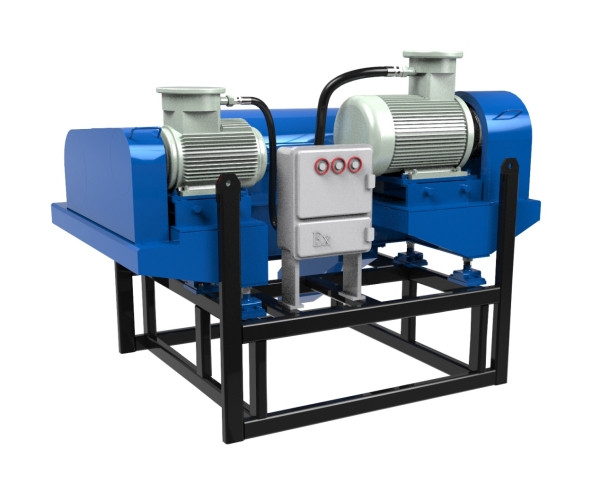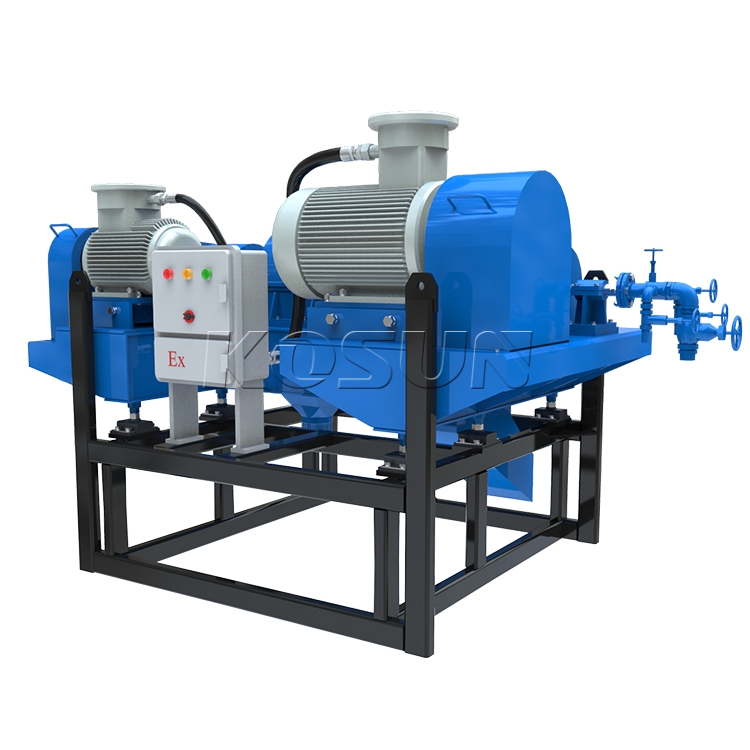Drilling fluid centrifuge is an essential equipment in oil drilling engineering, its main function is to separate solid particles in drilling fluid to ensure the performance and quality of drilling fluid. Selecting suitable drilling fluid centrifuge is of great significance for improving drilling efficiency, reducing drilling cost and protecting environment. This paper will discuss how to choose drilling fluid centrifuge from the following aspects.

First, understand the basic types of drilling fluid centrifuges
Drilling fluid centrifuges are mainly divided into the following types:
Sedimentation centrifuge: The use of centrifugal force to make solid particles in the high-speed rotating drum sedimentation separation.
Separation centrifuge: Through high-speed rotation, the liquid and solid particles of different densities are separated.
Filter centrifuge: Separates solids and liquids by filtering media.
Understanding the different types of centrifuges helps to select the right equipment for the specific drilling conditions.
Second, consider the properties of drilling fluids
The properties of drilling fluid are critical to the choice of centrifuge. Here are some key drilling fluid parameters:
Density: High density drilling fluids require higher centrifugal forces to effectively separate solid particles.
Viscosity: High viscosity drilling fluids require stronger centrifuges to handle them to avoid clogging.
Solids content: Drilling fluids with high solids content require more efficient separation equipment.
Third, determine the processing capacity
Processing power is one of the factors to consider when choosing a centrifuge. Processing capacity mainly includes two aspects:
Capacity: The volume of drilling fluid that the centrifuge can handle per unit time.
Separation efficiency: The proportion of solid particles that the centrifuge can separate from the drilling fluid.
Normally, the higher the processing capacity, the size and power requirements of the centrifuge will also increase accordingly.
4. Evaluate equipment performance parameters
When choosing a centrifuge, you need to pay attention to the following key performance parameters:
Speed: High speed means stronger centrifugal force, which can separate solid particles more efficiently.
Power: High power ensures stable operation of the centrifuge under high load conditions.
Wear resistance: The drilling fluid contains a lot of abrasive particles, and the wear resistance of the centrifuge directly affects its service life.
5. Consider the operation and maintenance of the equipment
Ease of operation and maintenance is also an important factor to consider when choosing a centrifuge. The details include:
Degree of automation: Highly automated equipment can reduce manual intervention and improve work efficiency.
Easy maintenance: Equipment that is easy to disassemble and clean can reduce downtime and improve equipment utilization.
Spare parts supply: Choose a brand with good after-sales service and spare parts supply, which can ensure the long-term stable operation of the equipment.
6. Economic analysis
Economy is a factor that cannot be ignored when choosing centrifuges. The economic analysis mainly includes:
Acquisition cost: The initial investment cost of the equipment.
Operating costs: including power consumption, maintenance and other expenses.
Service life: Although the initial cost of durable equipment is high, it is more economical in the long run.
Seven, environmental performance
With the increasingly stringent environmental requirements, it is particularly important to choose centrifuges with good environmental performance. Environmental performance is mainly reflected in:
Noise control: Low noise equipment is more friendly to the environment and operator.
Emission control: Effective solid waste separation and treatment can reduce environmental pollution.

conclusion:
Selecting a suitable drilling fluid centrifuge requires comprehensive consideration of many factors, including equipment type, drilling fluid properties, processing capacity, performance parameters, ease of operation and maintenance, economy and environmental performance. Through analysis and evaluation, centrifuges suitable for specific drilling conditions can be selected to improve drilling efficiency, reduce costs and protect the environment.

